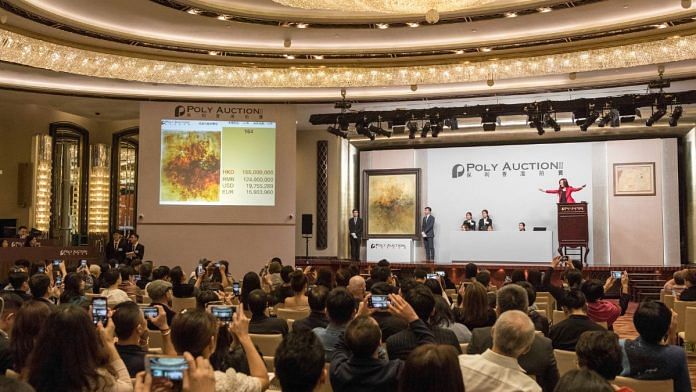Elites in China have long been purchasing art, paintings, and antiques as a means to hide their wealth from the Chinese Communist Party as well as to assert their status in the upper echelon of the country’s power circles. Although President Xi Jinping’s anti-corruption campaign initially slowed down auction sales, they have resurged in Hong Kong to a roaring success. The proliferation of auction houses from London to Hong Kong led to contemporary art and antiquities becoming popular avenues for hiding riches. In 2012, China’s growing wealth became evident worldwide as Chinese elites flocked to European capitals to acquire modern art and antiquities.
In 2021, despite the impact of the Covid-19 pandemic on the Chinese economy, art auction sales in mainland China reached $5.9 billion, accounting for 79 per cent of global sales. While this figure is lower than the peak of the Chinese auction boom in 2012 when sales reached $8.9 billion, demand for modern art and rare objects remains strong in China.
China’s gilded age
The Hu Jintao era, spanning the 2000s until Xi Jinping assumed power, was a gilded age for Chinese politicians who splurged on expensive art to conceal their wealth. Then in 2012, Xi launched a vigorous anti-corruption campaign to curb the excesses of the previous decade. Paradoxically, this campaign has only made the world of art auctions more attractive to those seeking to hide ill-gotten wealth.
I was in London last year, where I met students from mainland China studying the history of art, which piqued their interest due to Xi’s campaign to close corruption loopholes. Through conversations with these students, I learned about the thriving art scene in China and its connections to wealthy politicians, motivating students to pursue higher education that could open doors to leading art galleries or auction houses. Nowadays, Chinese students not only flock to Imperial College London to study Artificial Intelligence but can also be found at the Courtauld Institute of Art at Vernon Square in London.
As power transitioned from Hu Jintao to Xi Jinping, China’s affluent individuals, referred to as “robber barons”, grew increasingly ambitious in parking their assets, earned through connections to the CCP elite, worldwide. They employed intermediaries, commonly known as “white gloves”, to purchase expensive art and maintain anonymity. Sotheby’s and Christie’s, renowned auction houses, offered a shroud of secrecy that concealed the true owners of exclusive artworks and antiquities. China’s wealthy used shell companies and intermediaries to hold assets on behalf of the ultimate owner, who preferred not to be directly associated with the artwork or real estate.
For instance, a Vincent van Gogh painting sold in 2014 for $62 million at Sotheby’s was officially claimed to have been purchased by Wang Zhongjun, a Chinese film producer based in Hong Kong. But The New York Times investigation revealed that the ownership trail led to a Chinese billionaire named Xiao Jianhua, known for his deep connections to the CCP. Both Wang and the van Gogh painting have since disappeared, while Xiao was charged with “illegally absorbing public deposits” in 2022 after being abducted from a Hong Kong hotel in 2017.
Chinese leaders and business tycoons have chosen to store their wealth in Hong Kong, from where they can move their billions worldwide, depending on the political climate. Xi’s allies were not concerned about the suppression of the pro-democracy movement in Hong Kong, as their wealth remained secure in the city’s exclusive lockers.
Also read: Xi Jinping’s politics is driving China’s wealthy out of the country–with cash
The new wealthy
In his book Red Roulette, author Desmond Shum describes how he and his wife Whitney Duan used artworks to safeguard their wealth. “The jewelry jumped tenfold, and someone offered us ten times what we paid for the paintings. But we didn’t really acquire these things to realize gains. We locked them in a wardrobe-size antique safe that I purchased from Austria,” writes Shum.
The mid-2000 duels between Chinese billionaires to possess rare paintings continues to this day as Xi’s allies seek to park their wealth in art without attracting the attention of the big boss. Auction houses are hard-pressed to conceal the identity of the true owners of the antiquities and artwork they sell.
Art and antiquities have long served as tools of statecraft for Chinese elites since the establishment of the People’s Republic of China (PRC). In the 1960s, Beijing opened state-owned antiquity shops, which collected objects from the public and sold them to Western visitors to earn foreign reserves during a time when China was struggling to shore up its reserves. Premier Zhou Enlai instructed these shops to sell their collections to yield high returns on rare Chinese antiquities.
Even today, connections between art auctions and Chinese bureaucracy are not difficult to find. China’s largest auction house, Poly Auction, is owned by China Poly Group, a massive state-owned conglomerate founded by the People’s Liberation Army (PLA) in 1992. Poly Auction and China Guardian, another Hong Kong-based auction house, are actively seeking more contemporary art from Europe to compete with the thriving art auction scene in Hong Kong. Christie’s, Sotheby’s, and Phillips, three prominent global auction houses, are also expanding their presence in Hong Kong.
While Xi Jinping may have gained fame as the iconoclast who stopped the Chinese billionaire party, under his leadership, state-owned enterprises have encroached upon the domains of private businesses, creating a new generation of ultra-wealthy individuals. The shadowy world of art auctions and corrupt officials concealing their wealth has not disappeared under Xi’s rule but has rather transformed.
The author is a columnist and a freelance journalist. He was previously a China media journalist at the BBC World Service. He is currently a MOFA Taiwan Fellow based in Taipei and tweets @aadilbrar. Views are personal.



